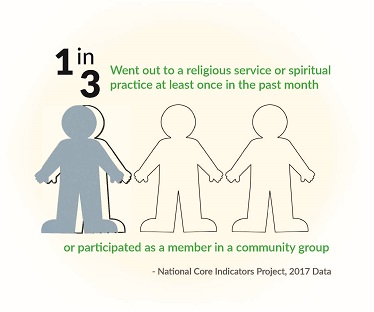Spirituality Survey
The OHSU University Center for Excellence in Developmental Disabilities is working to improve inclusion of people with disabilities in all areas of life. One of our initiatives focuses on improving access and inclusion to spiritual supports in faith communities across Oregon. We are starting by gathering some information. Participation in this survey is voluntary. This survey will take approximately 20 minutes to complete. We will not ask for your personal information and your answers are anonymous. We are collecting this information to learn more about how people with disabilities participate in their spiritual and faith communities and identify barriers to participation. By taking this survey, it allows the UCEDD to use the data to identify barriers to participation and partner with the community to develop strategies and supports that are more inclusive of people with disabilities in faith communities.
Who can take the survey?

Any youth or adult that has a physical or intellectual disability, a member or leader of a congregation or spiritual community, or someone who is answering on behalf of a person with a disability. People of all spiritual backgrounds are welcomed to take this survey.
We want to hear from you.
A special thank you to Dr. Erik Carter and colleagues at Vanderbilt Peabody College UCEDD for permission to adapt survey questions from The Strengths, Experiences, Spirituality, and Well-being of Young People with Intellectual Disabilities or Autism survey.
"The importance of Inclusive community supports, natural supports, and generic services has been highlighted for years in research and policy about the quality of life for individuals with disabilities and their families. However, very little of that research has addressed the most ubiquitous community based natural support organization in the country: the 350,000 plus churches, synagogues, temples and other faith communities. What role do they play in the lives of people with disabilities and their families? What have been their experiences, good, bad, or indifferent? How might service and support agencies best honor the spiritual lives of the people they serve and support? How might they best collaborate with faith communities to help meet those dreams and needs? We need to know…"
- Bill Gaventa, M.Div., Director, Summer Institute on Theology Disability. President of the American Association on Intellectual and Developmental Disabilities, 2016-2017, Author of Disability and Spirituality: Recovering Wholeness. (Baylor University Press, 2018)